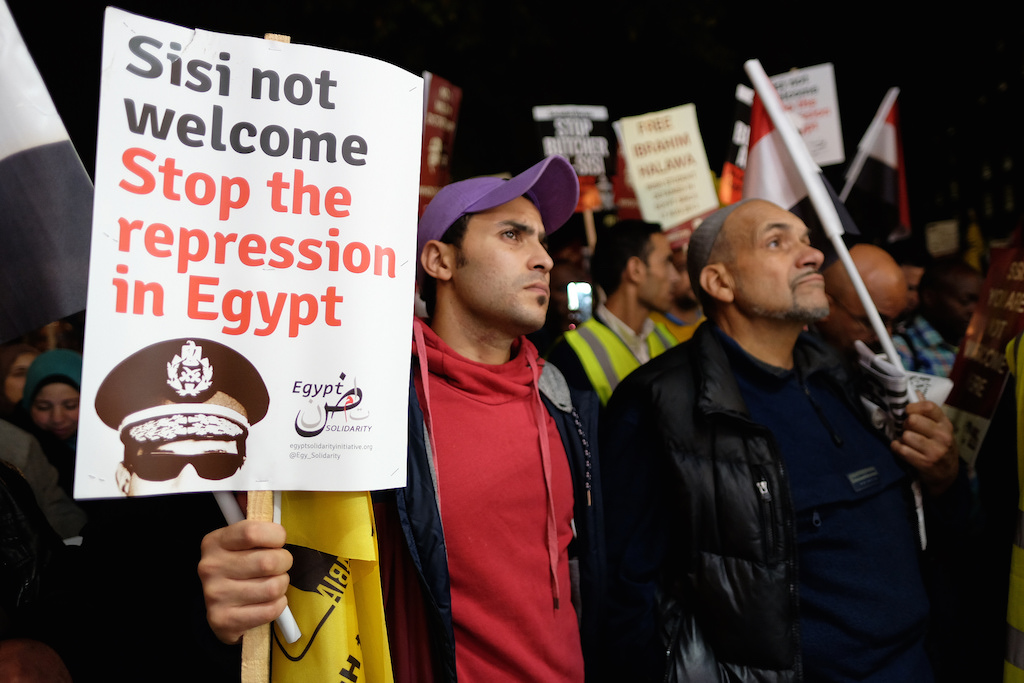Over seven years ago there was an uprising in Egypt that shook the Middle East and the world. The January 25, 2011 revolution that achieved the impossible and deposed of longtime dictator, Hosni Mubarak, was dubbed the Facebook revolution because of the prominent role Facebook and other social media played in making it possible.
Unfortunately, after a brief experience in democracy, the military, in collaboration with big business, staged a coup d’état in 2013, and put a halt on the democratic process.
As we approach the fifth anniversary of the military coup which ousted and imprisoned the democratically elected president, and turned the country into a military dictatorship where there is no rule of law, no human rights and no stability, we are also witnessing one of the most farcical elections the world has ever seen.
Even if you overlook the fact that the current regime, headed by Abdel Fattah el-Sisi, does not have the legitimacy to organize elections in the first place; ignore that the country has no independent judiciary or other institutions that can oversee fair elections; forget that the strong and organized political groups have been dismantled, and saw their leaders and their rank-and-file killed, imprisoned or exiled; and give the Sisi regime the benefit of the doubt, you will soon realize that — after all that — the president still did not want to give the people any choice.
Even though, by international standards, there was no prospect for a fair election, over the past few months, a few interesting candidates announced their intention to run, and seemed serious about it and ready for some sort of fight. A middle-rank army officer, Ahmed Konsowa, announced his intention to run and complained that he has been trying for years to resign from the military to be eligible but they would not let him go. He captured the imagination of some people so, a few days later, he was arrested and was subsequently sentenced to six years in jail by a military tribunal.
Next came Ahmed Shafiq, a Mubarak-era minister and briefly a prime minister. He was living in the UAE since 2011 and announced his intention from there. A few days later the UAE, Sisi’s ally and benefactor, deported him to Egypt where he disappeared for a few days to emerge saying that he discovered he was not the right man for the job.
Then there was the bombshell. Sami Anan, who was the army’s chief of staff since 2005 and through the time when the army was running the country, decided to run. In a very powerful speech he announced his intention and that he will have two vice-presidents who are well-respected civilians, one political science professor and the other the head of the state’s Accountability Authority. In a day he was also detained and is still in confinement until now.
There was also Khalid Ali, a lawyer and leftist activist who was involved in the 2011 revolution and prominent in the judicial fight against the government’s decision to hand over two Red Sea islands to Saudi Arabia. He withdrew voluntarily when he saw that there was no hope or chance under the circumstances.
That was it, the end of the serious candidates. But Sisi realized that running alone does not look good so they brought in a B-class politician, who no one knew of, and who was, and still is, backing Sisi, to run as a so-called opponent. His name, for the record, is Mousa Mostafa Mousa.
The Sisi vs. Mousa elections started for expats on March 16 and lasted for three days. The election will be held inside Egypt March 26 to 28. But it is clearly meaningless and very discouraging for the Egyptian people, especially the youth, who are not only being ruled by an oppressive dictatorship but also taken for fools.
We live in the age of the internet and the January 25, 2011 revolution was dubbed the Facebook revolution, so why not have an internet election, fair and open, to take place in parallel to Sisi’s farcical election?
A group of Egyptians living inside and out of Egypt decided to give it a go. We have all that is needed to run a safe, secure, meaningful and transparent election and put on the ballot all the names of those who the regime denied the right to run, in addition to those who did, give the voter the right to choose others as well, if he/she so wishes, and let the best man — unfortunately they are all men — win.
For the process to be meaningful the voter will have to enter his or her Egyptian National ID number (which is seldom known to others) so each person will be able only to vote once and only Egyptians over 18 will be allowed to vote.
The system was professionally built and secured to the highest standard and hosted on high availability secure servers. More information can be found about it here and the election website itself is up and running here: www.masr2018.com*. Unfortunately, since it is primarily addressed to Egyptian voters, most information there is in Arabic.
Yet, this may be the future!
Not only is this idea applicable to Egypt but if it spreads it will empower many oppressed peoples around the world and will clearly expose the illegitimacy of rulers who ignore their people’s voices and take them for granted, or worse, take them for idiots.
What comes after the Facebook revolution? Logically, internet elections.
*Masr is the Arabic name of Egypt pronounced in colloquial Egyptian
Photo: Alisdare Hickson/flickr
Like this article? Please chip in to keep stories like these coming.




